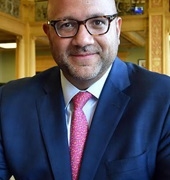“Each line item, each number, is much more than just a number. It is a statement of the Senate’s priorities and our values and what we hold dear.”
– Senate President Karen Spilka
With the House budget settled, it’s the Senate’s turn to look ahead towards 2020. The Senate Committee on Ways & Means released its budget earlier this month, and while several of the line items we support have been fully funded, there is still a funding gap for one critical issue — civil legal aid. And there’s also a chance to advance opportunities for youth experiencing homelessness in Massachusetts. Please take a moment and check out our budget priorities below and the amendments Senators Creem, Eldridge, Chandler, and Welch have filed for civil legal aid and for youth experiencing homelessness.
Your vocal support for these amendments and line items makes all the difference, and we can’t do this without you. Please join us and call your State Senator to ensure these key areas are fully funded and included in the Senate’s final budget!
First, the Good News…
Safe and Supportive School Environments
The Safe and Supportive Schools law, passed in 2014, was enacted to make the vision of safe and supportive whole-school cultures that address many barriers to learning a reality. I’m pleased to report that the Senate Committee on Ways & Means has recommended slightly above level funding ($500,000) for the Safe and Supportive Schools line item (7061-9612). This funding will be used to continue the Safe and Supportive Schools Grant Program, develop school-wide Action Plans, collect feedback from students, and more.
Youth Homelessness: Housing and Support Services
The Senate Committee on Ways & Means has recommended $5 million for housing and supportive services for youth experiencing homelessness (line item 4000-0007)! With reports of youth homelessness on the rise, it is critical that the state continue to invest in long-term solutions to build on past progress and provide much-needed support to vulnerable youth in Massachusetts. We look forward to advocating for the Senate’s recommendation when the Conference Committee convenes!
Budget Amendments That Need Your Support!
Civil Legal Aid
Civil legal aid organizations are often the last place low-income residents facing a civil legal crisis can turn to. For those dealing with life-altering legal issues such as eviction, domestic violence, and more, civil legal aid is a lifeline. We thank the Senate Committee on Ways & Means for recommending $22 million in its budget for civil legal aid, an increase of $1 million over last year.
But with civil legal aid organizations forced to turn away a MAJORITY of eligible residents seeking help every year, it’s still not enough.
Senate Majority Leader Cynthia Creem and Senate Judiciary Chair Jamie Eldridge have filed Amendment #976 to increase funding for the Massachusetts Legal Assistance Corporation (MLAC) line item (0321-1600) to $24 million.
As Senate President Karen Spilka said, the budget is a statement of our priorities and our values. We know civil legal aid is among our priorities, and we know it’s among yours. We must ensure it’s among the Senate’s as well.
Click here for more information about this issue.
Action You Can Take:
Click here to find your State Senator’s contact information TODAY and ask them to support Amendment #976.
Youth Homelessness: Massachusetts State ID
Without government-issued identification, youth experiencing homelessness are unable to complete many important and routine tasks, such as opening a bank account, enrolling in education programs, getting a library card, entering certain government buildings, and more. Right now, there are barriers in place that prevent youth experiencing homelessness from easily obtaining ID.
Some service providers for people experiencing homelessness estimate that half of their clients lack identification cards.
While we will continue to advocate for the passage of a refiled bill throughout the year that would eliminate these barriers, Senators Chandler and Welch have filed Amendment #464 that would address this issue now!
This amendment would establish a process to waive the $25 state ID card fee for youth experiencing homelessness (adding $50,000 to the Transportation Trust Fund, line item 1595-6368) and create an alternative application process if they cannot meet existing criteria (such as providing proof of residency). These are common-sense reforms that will enable youth experiencing homelessness to access the life-saving resources they need.
Click here for more information about this issue.
Action You Can Take:
Click here to find your State Senator’s contact information TODAY and ask them to support Amendment #464.
This time of year is so important, and I want to thank you for raising your voice and helping us get this year’s budget battles off to a great start.
By ensuring Amendments #976 and 464 are included in the Senate’s budget, we will have a better chance of obtaining adequate funding for civil legal aid and support for youth experiencing homelessness in the final budget that the legislature sends to the Governor this summer. Please call your State Senator and urge them to include civil legal aid and state ID for youth experiencing homelessness in their FY20 priorities.
Thank you for your continued support and advocacy.
Want to stay informed on the latest issues Massachusetts Appleseed is working on?
Sign up for future action alerts.






